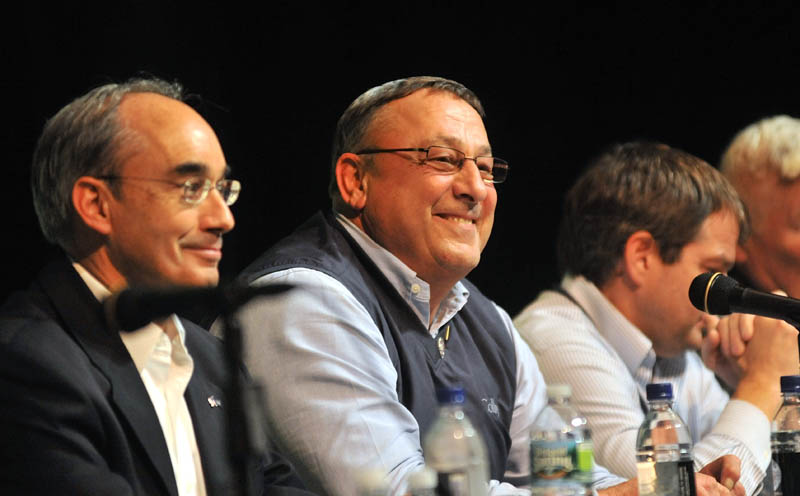A statewide survey released Wednesday shows a surge in Gov. Paul LePage’s job approval rating, and that unemployment now ranks as the most important issue facing Maine.
A majority of registered voters interviewed for the survey also said they believe bad economic conditions will last more than two years, even though the most recent recession officially ended in June 2009.
Their opinions are contained within a new tracking survey conducted by Critical Insights, a Portland-based research firm.
The survey found that, nine months into his tenure, LePage’s job approval rating had gone up by 16 percentage points from Critical Insights’ spring survey, to 47 percent. The survey said 40 percent of those interviewed disapprove of his performance.
The survey, which asked voters to identify their political party, revealed that 71 percent of Republicans approve of the governor’s job performance while 62 percent of Democrats disapprove.
Men, less educated Mainers and the youngest were more likely to approve of LePage’s performance than women, college graduates and people 35 years and older, the survey reported.
“I think the governor is seen by a lot of people as being a champion of economic development,” said MaryEllen FitzGerald, president of Critical Insights. “That’s where his traction is coming from.”
FitzGerald said the last time her firm did a survey, LePage’s job rating was lower because the governor was dealing with several controversies that included his decision to have a labor mural removed from the Department of Labor headquarters in Augusta.
Brent Littlefield, who is LePage’s senior political adviser, said the survey results do not surprise him. Other polls not involving registered voters have indicated that LePage’s approval rating is higher than 50 percent, he said.
“The Critical Insights numbers only confirm a trend of positive approval numbers for the governor.
Maine people realize that having a successful businessman as governor, someone who has actually created jobs provides the people of Maine their best shot at improving the state’s economy,” Littlefield said, in a prepared statement.
Each spring and fall, Critical Insights does a comprehensive, statewide public opinion survey of registered voters that covers a variety of topics of interest to business, government and the general public.
The survey, which was conducted between Oct. 18 and Oct. 23, was based on 600 telephone interviews with randomly selected registered voters. Each interview on average lasted 17 minutes. The sampling error is plus or minus 4 percentage points.
Some of the survey data regarding pending November referendum questions — there is no mention of the casino question — are considered proprietary and will not be shared with the public.
FitzGerald said the rest of the survey data that were collected is available to anyone. The information is typically used by government agencies, retailers and trade associations.
FitzGerald said that while concerns about the economy remain high, the survey uncovered an even deeper concern, one that surprised FitzGerald, who has been conducting surveys for nearly 20 years:
Forty four percent of respondents said unemployment is the most important issue facing Maine. In the fall 2009 survey, only 11 percent of respondents identified unemployment as the most important issue.
“That is a pretty significant uptick,” FitzGerald noted.
She said this is the first time “unemployment” has surpassed “the economy” as the most pressing issue.
“What that says to me is that the unemployment situation has become quite personal,” she said. “Everyone knows someone who is unemployed or are worried that a family member will lose their job.”
In a related question, voters were asked to name the economic or financial situation that will most concern them over the next six months. Job loss and the price of gas and utilities tied at 32 percent.
People surveyed were asked how much longer they thought poor economic conditions would last.
They were given four choices: Six months, one year, two years or more than two years. An overwhelming majority — 44 percent — chose “more than two years.”
“People don’t see any kind of relief in the near future,” FitzGerald said.
The survey also showed that:
• Despite the economic downturn, Maine residents’ ability to save money has remained relatively stable.
• 51 percent indicated they will vote yes on Question 1 to restore same-day voter registration, with 6 percent undecided.
Send questions/comments to the editors.




Modify your screen name
Join the Conversation
Please sign into your CentralMaine.com account to participate in conversations below. If you do not have an account, you can register or subscribe. Questions? Please see our FAQs.